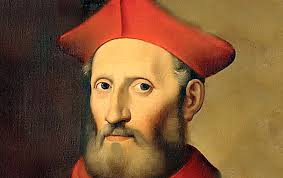Nick Page is the author of some 70 popular books in the area of religion, written from a quirky Protestant point of view. This is suggested by his subtitle: “Commemorating 500 years of Popes, Protestants, reformers, radicals and other assorted irritants”.
He begins by pointing out that the first historian of the Reformation, a servant of the Protestant Prince Phillip of Hesse, wrote a book that attempted to be fair to all sides, and “so naturally, everybody hated it”.
There can, in fact, be not more contentious subject that the Reformation, tangled as it is in the histories and politics of various countries, with mutually exclusive ambitions. Here in Ireland we are apt to see the matter through our own history and that of England and Scotland. But this book attempts something wider.
Divisive
He aims to put aside the myths – such as Luther nailing up his theses on the on the door of Wittenberg church, which never happened. But what happened was, goodness knows, divisive enough. He uses as an epigraph a comment from G.K. Chesterton: “The Reformer is always right about what’s wrong. However, he’s often wrong about what was right.”
As is so often the case a Chestertonian paradox neatly summarises the matter.
Page’s sparkly narrative, which is always amusing to read, but also well informed, covers the ground nation by nation, reformer by reformer.
There is also, as there has to be, a set of chapters devoted to the counter reformation, perhaps better called the Catholic Reformation.
But he also reminds us that the Church was too well aware of things that were wrong. Many were pointed out by Cardinal Contarini in 1511. The point is, as he underlines, that Christianity has always been “a religion of renewal and reformation. Reformation – which comes from the Latin reformatio – is the life blood of the Church”.
A clearer understanding of Church history, such as is now available to all, shows this to be true. Like some great tree the Church grows and changes, yet stays the same.
For Page this is illustrated by arguments over when the Reformation ended. He chooses a very British date, 1649, which has echoes in our own history. But in a sense the Reformation, through its continuing influence on all the Churches, still continues.
There remains “still a broad lump that is known as Catholism”, but on the other side “there are a host of Protestant Churches, there is no one Protestant faith” – an astonishing 33,000 denominations, many of them personal ministries in Africa.
The certainties that seemed so vivid to Luther, Calvin, Zwingli and Knox are less certain now.
Today, many of the certainties of the Reformation seem a lot less certain. Catholics and Protestants are often to be found on the same side of the barricades, arm-in-arm against secularism, relativism, atheism, Islam, globalisation, and many other threats.
Approach
Increasingly, Catholics are adopting Protestant approaches to worship and their study of the Bible, while many Protestants are discovering the riches of Catholic spirituality and embracing the mysteries of ritual and liturgy.
They go on retreats, and embrace disciplines like fasting and Confession. And Christians on both sides of the fence obey their leaders if and when they want to.
These people are like Luther making their own stand on the basis of their own conscience and their own reading of the Bible. This is very ‘reformation’. But surely it will only work if they trouble themselves to actually read the Bible, to inform their personal conscience, and merely accept the latest evangelically influenced opinions from America.
Nick Page is to be recommended to those who find academic history daunting. It is an enjoyable book, and it will not lead them too far astray from the approximate truth about what happened in the Reformation.


 Peter Costello
Peter Costello Cardinal Contarini.
Cardinal Contarini. 